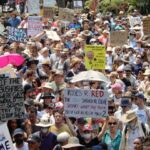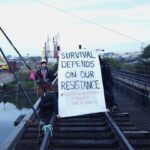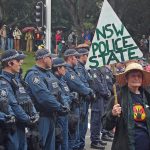“We Have a Conservative Anti-Protest Consensus in Politics”, Says Legal Observers NSW’s Anastasia
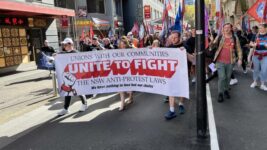
Protest is an exceptionally important part of the NSW liberal democracy, especially considering how it works: citizens get to vote every four years, and from there, for the most part, the government tries to ignore their desires and opinions, unless they get out on the street to voice them.
The Perrottet government has just attempted to put a stop to this irritation by passing some of the most draconian anti-protest laws in any western liberal democracy. And while it’s a Liberal Nationals government, it had the full support of Labor in this major silencing of the constituency.
These laws were triggered by a series of protests taken by climate defence groups Fireproof Australia and Blockade Australia, who’ve been taking disruptive actions because government refuses to act on climate, despite megafires and extreme flooding having swept the continent.
Indeed, one of these protests actually made NSW road minister Natalie Ward late for work.
However, the NSW Liberal Nationals government, with the approval of NSW Labor, took the opportunity to pass such far-reaching laws that it’s possible for the authorities to supress the voice of those seeking to highlight any particular issue via threat of extremely oppressive penalties.
Suppressing public voice
Rammed through parliament over a 48 hour period, the anti-protest bill amended section 144G of the Roads Act 1993 (NSW), so if a person disrupts or obstructs vehicles or pedestrians on any bridge, tunnel or road, they’re liable to maximum penalties of 2 years imprisonment and/or a $22,000 fine.
And it inserted section 214A into the Crimes Act 1900 (NSW), which contains the new offence of damaging or disrupting a major facility, which carries the same penalties and constitutes obstructing or disrupting the use of a facility, causing redirection to it, or resulting in the facility being closed.
Both laws contain a clause stating that this disrupting or obstructing doesn’t constitute an offence if the NSW Police Force or another public authority has consented to it, which has provided state authorities with a very broad scope to pick and choose what issues make it to the street.
What constitutes a major facility is set out under section 4A of the Crimes Regulation 2020 (NSW). Broadly, these are railway and metro stations, other public transport facilities, ports and infrastructure facilities.
Town Hall station is captured by this, which poses a serious threat to the long-held tradition of staging protests on the steps at Sydney’s Town Hall.
Supporting public voice
Legal Observers NSW is an organisation that has long been attending protests in this state, with the aim of providing demonstrators with information regarding their rights, monitoring the behaviour of NSW police officers, and facilitating access to legal help for those in need of it.
Anastasia is a volunteer legal observer. She attended last weekend’s 2022 May Day rally at Sydney Town Hall, and although she wasn’t there in the capacity of an observer, she relates that the new laws passed on 1 April are already having a discernible impact on protests.
Sydney Criminal Lawyers spoke to Legal Observer NSW volunteer Anastasia about the reasons behind the bipartisan mission to silence demonstrations, the media demonisation of protesters and the shift that’s occurred in terms of alerting police to protests to now having to seek permission.
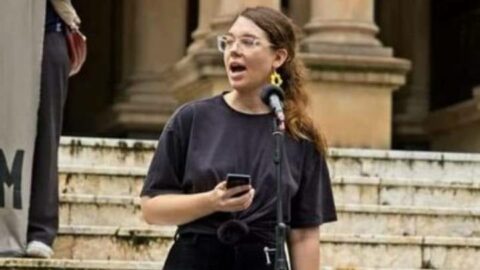
Firstly, Anastasia, in introducing the new laws into parliament, attorney general Mark Speakman points to the process in the Summary Offences Act that facilitates legal protests via the notifying of police.
But you’ve pointed out in a recent article in Mutiny that provisions in the newly passed laws have actually upended how this process works.
What are your major concerns about the new anti-protest laws? And can you elaborate on how these laws have altered the old process.
My biggest concern about these laws is that they make it a lot riskier to engage in any kind of protest or demonstration in NSW.
Prior to these laws being introduced, anyone engaging in a protest that blocked traffic could protect themselves from being charged with obstruction offences by notifying police of the protest beforehand.
It was enough that police were aware of the protest. They did not have to give specific consent. And even if police weren’t notified, the worst that could really happen was a traffic obstruction fine of $400.
Now, a protest that even redirects access to a road or railway station, including iconic sites, like Town Hall or Martin Place, requires police approval in order to have protection from a $22,000 fine or 2 years gaol.
That approval can take time to get, time which a lot of snap protests don’t have.
It also gives the police an opportunity to push back on the conditions of the protest and have a much heavier hand in deciding what protests look like.
And we mustn’t forget that the nature of protests as fluid and changing demonstrations sometimes means that things happen spontaneously, new routes are taken, and people go in different directions.
As soon as that occurs, the protest no longer enjoys protections from the new laws because it deviates from the plan agreed to by police.
So, what are the implications of this increased emphasis on police approval?
The really concerning implication of this is that it is now much more dangerous to protest without police approval in NSW.
This increase in police power means that police are more emboldened to exercise strict control over protests and crack down on protestors who aren’t staying in line.
This disproportionately impacts communities that are hardest hit by police violence, especially First Nations communities.
At Invasion Day 2021, we saw how police intervention in protest can result in violence, when the organisers were forced to disperse the crowd from the Domain under police pressure and a breakaway march at Hyde Park was met with police kettles and assaults.
Two people were charged as a result of that, with one receiving a two year good behaviour bond.
The more power police have to intervene, the more confusion and violence is created at protests. These laws embolden the police to do even more than they already do.
And what might be some of the not so obvious aspects that these new laws will have on protesting going into the future?
A not so obvious implication is the chilling effect this will have on the protest participation of groups that are wary about attracting criminal charges.
I’m thinking particularly about more conservative unions and NGOs: both organisation types that face serious consequences for their funding and operations if they fall foul of any criminal laws.
There is already a lot of fear from certain unions and NGOs about participating in protests that aren’t 100 percent approved by police and that aren’t strictly controlled.
We even saw certain groups not participating in the School Strike 4 Climate, when it was moved from the Domain to Kirribilli at the last minute, with no time to notify police to guarantee protection.
In the context of continued attacks on the capacity of unions and NGOs to work together with communities, this chilling effect is particularly concerning.
The conservative mainstream media, in particular 2GB, played a part in these laws coming into fruition.
In your article, you further discuss the issues around the demonisation of protesters by the media as well as reactionary politicians.
What purpose does this casting of demonstrators in a negative light serve? And how might it be detrimental to the general public in the long run?
Aside from the obvious purpose of creating outrage and advertising revenue, all the demonisation of protests we’ve seen in the media recently is part of how our liberal state operates.
Collective action is a challenge to representative democracy because it suggests that representative democracy is failing.
We are meant to believe that representative democracy is an effective means of ensuring citizens’ participation in the decisions that govern our lives.
The last decades of growing political and economic inequality, media partisanship and the deterioration of the communal sphere have deepened the fault lines in this system.
Our failure to act on the existential crisis of climate change is just one example of how our current political system is structurally incapable of resolving collective questions.
But when collective action rises to meet this challenge, the liberal state must respond by affirming its own legitimacy.
This is how we see responses like the sign-off on the A Current Affair’s story on Fireproof Australia, “Well, everyone has a right to make their point, but there are legitimate ways to do that – we live in a democracy”.
When 80 percent of voters want stronger climate action than the government or opposition are prepared to take, we have to ask how true that statement is.
And in that context, the demonisation of any kind of collective power except that expressed at the polling booth seems like a tactic to get us to look the other way from the objective failure of our political system to create a liveable society.
You’re a volunteer for Legal Observers NSW. Can you tell us a bit about how the organisation operates? And do you think these new laws are going to alter the process of observing protests?
Legal Observers NSW is a non-hierarchical grassroots organisation that monitors police action and connects protestors with legal support.
We are a small group of people who care about protestors knowing their rights with police and being able to exercise them, as well as have the support necessary to stand up to state violence.
We don’t enjoy any special protection as observers and there is certainly a risk that observing protests will become more dangerous with these new laws.
We are closely monitoring developments in protest policing to be able to respond to the increased risk as it develops.
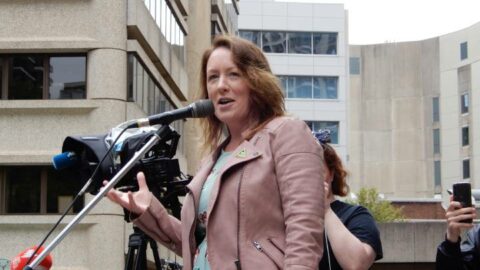
You took part in the 2022 MUA May Day rally and march last Sunday. The rally commenced at Sydney Town Hall.
Town Hall Station is now listed as one of the major facilities that carries heavy penalties in regard to disrupting it.
Were their discernible differences compared to other rallies that you attribute to the new laws?
The May Day rally felt the influence of the new laws from the start. Police refused to shut down the light rail in front of Town Hall like they normally do for big protests, using the new laws as an excuse.
The rally was forced into Town Hall Square, where it had much less interaction with passers-by. The long-standing tradition of speeches on the steps of Town Hall was unable to take place.
You organised the Right to Protest contingent, which took part in the May Day rally. What was the contingent all about?
Our Right to Protest contingent joined the Maritime Union of Australia contingent in recognition of the longstanding role of the MUA on the frontlines of resistance and their strong stance against state repression.
Greens MP Abigail Boyd, who opposed the laws in the upper house, gave a speech on the importance of resisting attacks on our right to protest.
The contingent then took the road in defiance of the laws and marched from Sussex Street to Town Hall.
We were able to take the road without incident and safely make it across to Town Hall, much to the surprise of the 100-plus police officers gathered there.
And lastly, Anastasia, these new laws were sparked due an escalation in climate actions, yet their scope is much greater than those specific actions or causes.
Not only has the breadth of these laws come into question, but the way they were ushered in at such a fast pace and forced manner has been scrutinised as well.
So, looking at the broader political climate in this country, how do you consider the appearance of such draconian anti-protest laws at this moment in time?
The fact that these laws could be passed through parliament within 48 hours of being introduced and with the support of Labor reminds us that we have a conservative anti-protest consensus in politics that will continue to get worse and worse unless we challenge it.
The right to protest and the right to strike have been restricted so much over the last two decades that effectively only state-sanctioned demonstrations are allowed.


